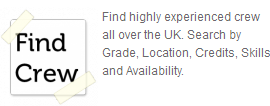Page 1 blog: CV tips
Page 1 blog:
A blog for those getting into Film and TV, written by those who work in it.....
CV Tips:
A decent CV should be kept plain and simple and easy to read. The person you are sending it to will see a lot of them and they need to glean key information about you quickly. You’ve only got a small window of time to impress them and give them an incentive to read further.
We see a lot of the same mistakes, all the time. The tips below include some real examples and have been picked up from looking at thousands of CVs over the years.......
Tips for writing your CV
 Remember to say what you do very clearly at the top of your CV, right next to your name if possible. Make sure it bears some relation to the roles on the credits that you’ve listed below. Don’t call yourself ‘Filmmaker’ unless your name is Scorsese, Broomfield or Tarantino etc. The term Filmmaker implies that you are an auteur who can pick and choose projects at will. If you are looking for work and applying for a job, use the term Director, Editor, Runner or whatever applies best to your chosen field and experience.
Remember to say what you do very clearly at the top of your CV, right next to your name if possible. Make sure it bears some relation to the roles on the credits that you’ve listed below. Don’t call yourself ‘Filmmaker’ unless your name is Scorsese, Broomfield or Tarantino etc. The term Filmmaker implies that you are an auteur who can pick and choose projects at will. If you are looking for work and applying for a job, use the term Director, Editor, Runner or whatever applies best to your chosen field and experience.
If you've shot a few short films or held the camera on a uni film, that does not make you a cinematographer. Newcomers; you need to think about what title to describe yourself as. If you are unsure, the chances are you should put 'Runner'.
There is no shame whatsoever in being a runner. The production manager or head of department you are sending your CV to was probably a runner themselves at some point.
Make sure you put dates next to the projects that you have worked on. How long did you work on it for? A day, a month, a week, a year? If you’ve got gaps in your CV then explain them. Don’t let the reader jump to the wrong conclusion.
If you’ve worked dailies or crowds on a project then you need to make that very clear. Don’t claim to be part of the main team if you weren’t. That sort of thing catches up with you when the people who were on the main team see it. It’s disrespectful and dishonest.
Credits need context. Don't just put ‘TV commercial’ - put the product, script title, Producer, Director, HoD and always, always list the production company. Make credits comprehensive enough so that the reader can see who you worked with. They might just know someone listed and be impressed by that association.
Don’t list a Porno channel among your credits. Unless you are applying for a job on a late night bongo show, leave ‘babestation’ off your CV. It's low rent and cheapens your other (non-grot) achievements listed (and yes, this has happened).
Make sure that you get the title of the productions correct. List your productions by type and chronology with the most recent at the top. If your most recent project hasn’t been released yet, say so and put the estimated release or TX date on it.
An eleven page CV is too long (it had a cover page and an index!), 12 pages is just ridiculous (we didn't know a single credit on it either) One page is OK, two is ideal and for three pages or more you need a good reason. A good CV should be like a script so cut away any sentence that doesn’t serve a purpose.
There is a tendancy for listing achievements within a credit, This happens more in TV than film and perhaps the sectors might never align on this point. A Production Manager shouldn’t need to describe their role on a given job as:
“Wrote call sheets, booked crew, organised insurance, managed budget”
That is what EVERY production manager does and comes as standard in the PM Job description! Unless you have a really good reason to add extra description, leave it out. A brief 500 word character summary of personality and notable achievements is better than CV waffle. Stick to the key facts about the productions and the roles you undertook.
More after the jump....
If you are going to include an ‘interests and hobbies’ section, don’t be boring. If you were a former barrister or built shelters for refugees in Indonesia (seen both), definitely put that stuff in. If you find the first thing you write is ‘socialising with friends’ then delete it, you may as well write "piss-head".
Don’t hide any important information in a sentence when it would stand out far better as a bullet point. If you’ve done the latest BBC Health and Safety course, you're a member of AMPS and on thecallsheet.co.uk, that information can get lost in the paragraph. The reader is more likely to read something that stands out, like this:
- BBC Health and Safety trained (2012)
- Full Member of AMPS
- Pro member of thecallsheet.co.uk
Some additional annoyances and gripes that sometimes appear on CV's.....
- Puffing up or padding out the duties of the role e.g.‘I was instrumental in providing high quality refreshments’.
- Disguising of the actual role by ‘bundling’ credits (i.e. I was 1st, 2nd and 3rd AD across the following productions....). The reader will immediately identify that as mis-direction and assume you were the 3rd AD for all of them. Don't makes claims about something you didn't do.
- No dates!!! Put dates of all productions including the correct title and series.
- No DOB or driving license details on a Runners CVs. Driving is a big part of running and the production office needs to know if they can insure and trust you.
- Shit fonts. Don't do it. (shit fonts include Comic Sans and Heavy Heap, but especially Comic Sans). This is a visual industry and a bad font can (sadly) count against you. Go for Arial or Calibri.
- If you are going to include a picture, don’t use a professional headshot. It’ll look like you’re an actor, and a bit of a tw*t. A simple, smiley mug shot against a plain background would suffice if you are going for that sort of thing.
- When saving your CV, check that the last couple of lines don’t slip onto a new page. See if you can condense the text.
- If you want potential employers to view your website or look up your profile somewhere, include a working link in your CV and test it beforehand.
- Check that when you save your CV as a PDF, it hasn’t saved with additional extra blank pages.
- Save in Word or PDF only, unless you are in the art department, in which case a Jpeg or Png is probably permissible if you are sending your CV to a HoD.
- Don’t save the file as “CV.doc”. If the reader is collecting and categorising more than one CV, they will want your name AND your role on in the file name. It means that they can find your CV easier if they save it to their desktop. The format should be something like FirstnameSuraname Role CV Jan 2013.pdf
- Choose your email address carefully. Keep it professional. We also see some email addresses that use their job title eg johnsmithrunner@gmail.com. What happens when you want to step up to 3rd AD or a PA? Do you change your email address, move contacts and send everyone a notification to update their records? Will everyone change their records? What happens when you move from 3rd AD to 2nd? Conversly, if you are camera trainee, don't use johnsmithDoP@gmail.com.
If an employer were to Google your name (which happens A LOT), what would they find? Pictures of you pissed up on facebook? (check your privacy settings), Offensive remarks or jokes on twitter? a tumblr or blog? You don't want an employer to discover something that might damage your chances of getting the job. Jake Humphrey's rules on tweeting are worth noting...
My own rules;1-I don't tweet when drunk2-I don't tweet when angry3-I don't tweet what I wouldn't shout out loud#ThinkBeforeYouTweet
— Jake Humphrey (@mrjakehumphrey) October 8, 2012
There are generally three types of CV that you might typically need or use when looking for work.
1. Reactive - responding directly to a job post.
2. Speculative - approaching production companies or individuals to ‘fish’ for work.
3. Profiled - uploaded to a website (like this one) where people can find you.
There's about five hundred reputable production companies listed on thecallsheet.co.uk directory, all working in Film, TV, Commercials or Promos. Go through the list and check out their websites before sending any emails.
3) Profiled CVs
Make sure that you keep your CV up-to-date and try to get into the habit of updating it as soon as you complete a job. Keep your online profiles current as well. If you use thecallsheet.co.uk, the ‘add new credit’ and ‘I worked on this’ buttons make updating your profile quick and easy, and your credits will immediately become part of the big database so you can be found by potential employers.
Have a look at the next blog about networking and getting beyond just your foot-in-the-door. All the secrets will be revealed.... well, you know, that sort of thing.
*The Page 1 blog does not represent the views and opinions of thecallsheet.co.uk. The information contained in this Blog (the "Blog") is intended solely to provide general guidance on matters of interest for the personal use of the reader, who accepts full responsibility for its use. While we have made every attempt to ensure that the information contained in this Blog has been obtained from reliable sources, thecallsheet.co.uk is not responsible for any errors or omissions, or for the results obtained from the use of this information
If you’ve got any other suggestions or gripes, email page1@thecallsheet.co.uk

Comments